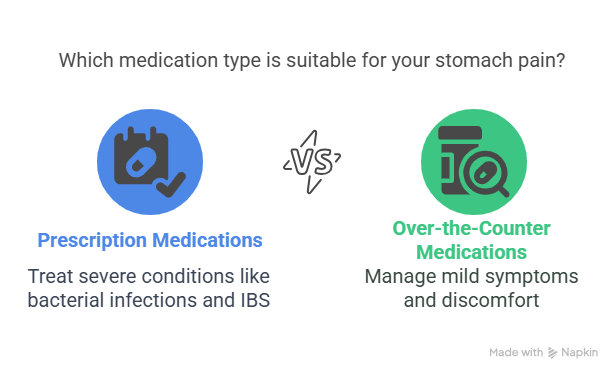Debilitating stomach discomfort might interfere with everyday activities and general health. Finding comfort is essential, and it is possible with the correct stomach painkillers.
In India, millions of people have stomach problems and are looking for efficient ways to relieve their discomfort. With so many alternatives accessible, finding a solution might be intimidating.
The first step to finding relief from a stomachache is being aware of the many treatment choices accessible. The purpose of this post is to provide you a thorough summary of the best medications that are effective so that you can make an educated choice.
Recognizing the Various Types of Stomach Pain
For stomach discomfort to be effectively relieved and treated, it is important to comprehend its nature. From minor and transient to severe and persistent, stomach discomfort may vary.
Typical Reasons for Stomach Pain
Numerous conditions, such as infections, gas, and indigestion, may result in stomach discomfort. To choose the finest over-the-counter medication for stomach discomfort, it is essential to determine the reason.
When to Get Medical Help
It’s critical to get medical help right away if stomach pain is severe, ongoing, or accompanied by other worrisome signs like blood in the vomit or extreme soreness in the abdomen.
Guidelines for Self-Diagnosis
People may use self-diagnosis techniques for minor stomach discomfort, such as keeping an eye on symptoms and using over-the-counter or natural therapies. However, it is advised to speak with a healthcare provider if symptoms continue.
Which Drugs Are Most Effective for Stomach Pain?
The best medication to treat stomach discomfort depends on the underlying reason. Over-the-counter (OTC) drugs like antacids or acid reducers may provide immediate relief for minor stomach pain. Acid reducers like ranitidine (Zantac) lessen the formation of stomach acid, while antacids like Tums or Rolaids neutralize it.
Prescription drugs may be required for more severe stomach discomfort. For example, omeprazole (Prilosec) and amoxicillin are examples of medicines that may be recommended if the discomfort is caused by a bacterial infection. Drugs like dicyclomine (Bentyl) may help reduce cramps and abdominal discomfort when stomach pain is linked to irritable bowel syndrome (IBS).

To choose the appropriate medication for stomach pain, it is essential to speak with a healthcare provider. They can suggest the best ways to relieve stomach discomfort and assist in determining the underlying reason. People may locate the best medication for stomach pain and make educated choices about their care by being aware of the many forms of stomach pain and the therapies that are available.
FAQ
What are the most effective over-the-counter (OTC) medicines for stomach pain relief?
Popular OTC options for stomach pain relief include antacids like Tums, Rolaids, or Mylanta, which help neutralize stomach acid. Anti-diarrheal medications like Immodium can also be effective for stomach pain caused by diarrhea. Additionally, products containing simethicone, such as Gas-X, can help alleviate gas-related discomfort.
When should I consider prescription medications for stomach pain?
If your stomach pain is severe, persistent, or accompanied by other concerning symptoms like bleeding, fever, or difficulty swallowing, you should consult a doctor. Prescription medications may be necessary for underlying conditions like ulcers, acid reflux, or inflammatory bowel disease. Your doctor may prescribe medications like proton pump inhibitors (PPIs), H2 blockers, or antibiotics to address the underlying cause.
Are there any natural remedies that can help alleviate stomach pain?
Yes, several natural remedies can provide relief from stomach pain. Ginger, peppermint oil, and chamomile tea are known for their soothing effects on the stomach. Probiotics, found in supplements or fermented foods like yogurt, can also help maintain a healthy gut microbiome. Additionally, avoiding trigger foods and staying hydrated can help alleviate stomach discomfort.
Can I take stomach pain medication with other medications?
It’s essential to consult your doctor or pharmacist before taking stomach pain medication with other medications. Certain combinations can interact or exacerbate side effects. For example, taking antacids with antibiotics or blood thinners may reduce their effectiveness or increase the risk of bleeding.
How do I choose the best medicine for my stomach pain?
To choose the best medicine for your stomach pain, consider the underlying cause, severity, and duration of your symptoms. If you’re unsure, consult a healthcare professional for guidance. They can help you determine the most effective treatment based on your specific needs and medical history.
What are some common side effects of stomach pain medications?
Common side effects of stomach pain medications vary depending on the type. Antacids can cause constipation or diarrhea, while anti-diarrheal medications can lead to constipation. Prescription medications like PPIs can cause headaches, dizziness, or nausea. Always read the label and consult your doctor or pharmacist if you experience any adverse effects.

